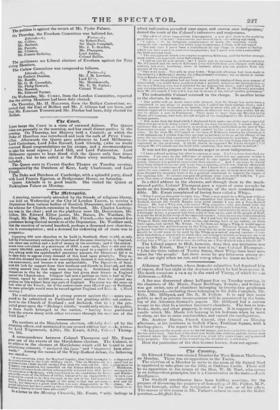the aftctropoTitt.
A meeting, numerously attended by the friends of religious liberty, was held on Wednesday at the City of London Tavern, to receive a Deputation from various bodies of Scottish Dissenters, and to consider the scheme for Church-extension in Scotland. Mr. Charles Lushing- ton was in the chair ; and on the platform were Mr. Dennistoun, Mr. Gillen, Mr. Edward Ellice junior, Mr. Baines, Dr. Wardlaw, Dr. Heugh, Mr. King, Mr. Harper, and Mr. French,—the last-named five gentlemen being clerical members of the Deputation. Dr. Wardlaw said, that the erection of several hundred, perhaps a thousand new churches, was in contemplation ; and a demand for endowing all of them was in prospect— Supposing 800 new churches to be built in Scotland, these walla, at only half the Parliamentary estimate for churches of the same description in England, cost about one million and a half of money in the erection ; and if the endow- ments were calculated at a minimum of 2001. a year each, they we old cost the country 160,0001. annually; which would be equal to a capital of 4,000,0001. Bat, setting aside the apprehended pecuniary amount, the Dissentas felt it to he their duty to oppose every demand of this kind upon principle. They re- amed this demand because it was unscriptural, because it was unjust, because it was unnecessary, and because it was uncharitable. The Dissenters of Scot- land did look for support from their brethren and friends in England, and this meeting assured him that they were receiving it. Scotchmen had entitled themselves to this by the support they had given their friend. in England against the Church.rates. Glasgow had sent a petition on their lo half to Par- liament, signed by 42,000 persons,—a greater number than had signed any petition on this subject from any part of England. The cause Wa, the same on both sides of the Tweed ; for if the endowments were effected agait st Scotland, the same principle would soon be turned against England and hat. d, clinch
cheering.)
The resolution contained a strong protest against the n s asure pro- posed to be submitted to Parliament for granting additi, nal endow- ment to the Church of Scotland ; and declared, that to I. y the pro- jected grant upon the "Bishop's teinds," would only mislena the public, as those funds belonged to the nation, " having been purchased from the crown along with other revenues through the med um of the Civil List."


























 Previous page
Previous page